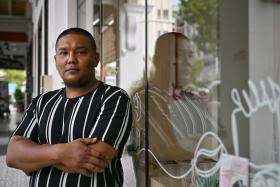Career coaches help ex-offenders stay in their jobs for the long haul
After leaving a drug rehabilitation centre (DRC), Mr Muhammad Razmi had hoped his job as a pizza delivery rider would mark a new beginning.
But he found himself arguing with his supervisor instead.
The 38-year-old father of four had requested to work near his flat in Yishun, so he could take his five-year-old daughter to and from kindergarten.
But the manager posted him to work in Ang Mo Kio.
In protest, Mr Razmi took two weeks’ leave without informing him, which only angered the latter.
The conflict was defused when Mr Gabriel Lee, 34, a career coach from Yellow Ribbon Singapore (YRSG), stepped in.
Mr Lee called the manager and explained Mr Razmi’s point of view. He also highlighted Mr Razmi’s good work performance, and eventually convinced the manager to let him stay at the Yishun outlet.
Now, with Mr Lee’s help, Mr Razmi is seven months into the job.
Said Mr Razmi: “If I have any problems at my workplace, anything about the pay or work, I’ll find Gabriel first.”
A YRSG spokesman said employment allows former offenders to be financially independent and improves their quality of life, which lowers the risk of reoffending.
The agency, which assists former offenders with training and employment, has around 26 career specialists and coaches.
Career specialists help to match inmates with job placements. In 2022, YRSG helped 2,615 inmates, and 93 per cent got a job.
Finding a job is one thing, staying in it is another.
In 2021, 94 per cent of 2,969 inmates who received YRSG’s job assistance secured work. But only 66 per cent kept the same job after six months, according to the agency’s 2021 annual report.
This is where career coaches like Mr Lee come in. They guide former offenders for up to a year in their new job, and help to resolve any work-related issues.
Mr Lee, who has been a career coach for 1½ years, said former offenders tend to react hastily to problems at work.
He said: “For example, their first response is they just want to quit and find a new job.
“But my role is to say, ‘let’s see how we can solve the issue first, so you can continue in this current position’.”
He added that he works with 80 to 90 former offenders at any one time.
He once guided a former offender through three jobs.
The man was fired from the first one in the cleaning industry after raising his voice at his employer during a phone call.
Said Mr Lee: “It’s just his personality, but I told him not every employer would see it that way. Some might think you are rude.”
In his haste to secure work, the man took another job in the food and beverage industry, only to realise he could not carry heavy amounts of ingredients. Mr Lee advised him to be patient and look for work better suited for him. Now, he is five months into his current job in the cleaning industry.
Employers, too, have shared their concerns with Mr Lee – such as when they suspect their employees are taking drugs again.
He said: “I would advise them that if they see any evidence, (they can) just call the police. I also tell them that when (former offenders) are working, they also need to go for urine tests.”
He acknowledged that there are reports of those who commit crimes at work, but believes this does not paint a complete picture of former offenders.
Mr Lee said: “For every story (published) about such cases, I would think there are many more who are unnoticed but doing their jobs. One rotten egg doesn’t mean the whole basket is spoilt.”
As a former drug offender, Mr Razmi knows it is difficult to stay on the straight and narrow.
He had previously been released from a DRC in 2017, but reoffended five years later and was sentenced to another 18 months in a DRC.
Now, he cherishes his second chance at freedom.
The job allows him to feed his children, aged five to 15, and he hopes to go for upskilling courses to increase his income.
He said: “I just want to be busy, so I have no time to get involved in drugs and find all my old friends. They’ll know this man is busy, he needs to take care of his family.”
Get The New Paper on your phone with the free TNP app. Download from the Apple App Store or Google Play Store now

